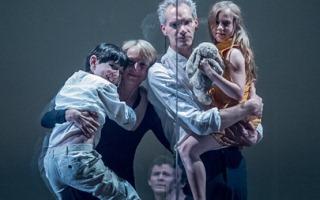Oresteia Review 2015
Robert Icke's version of Aeschylus' harrowing domestic drama is one of the most powerful productions to hit the West End in recent years. In what can only be described as a landmark revival, the three plays of the Oresteia Trilogy are brought to life as one arresting and captivating drama spanning decades and confronting the audience face on with the bloody events.
Icke's adaptation is not only fresh and invigorating but speaks so perfectly to our generation. For a play that is 2500 years old, the question of justice, mercy and what it means to be guilty have never felt more relevant. The narrative centres around a utilitarian decision to kill one's daughter to save a nation and the debate extended from the stage and into the audience - a true mark of gripping and important drama.
The central performances are nothing short of revelatory. Lia Williams makes a chilling a multi-dimensional Clytemnestra that slow burns to fruition throughout the three and a half gripping hours, and by the time she lets go and screams like a banshee she has you terrified to move. It's a marathon of a performance and one that switches throughout the decades effortlessly, from the devoted wife and stateswoman (with tones of Claire Underwood) to chilling killer - she's in full control throughout. Ophelia Standen as the young Iphigenia has such a haunting realism that the plot device thoroughly works and she silently torments all four acts as a moral arbiter.
The naturalism in both Luke Thompson and Angus Wright's portrayals of Orestes and Agamemnon works equally well in bringing a contemporary light to Icke's updated text. We see the events through the eyes of older Orestes as the bloody murders are reconstructed, and his detachment helps build the necessary tension within the fully realised narrative construct.
Whilst the themes are expansive, the drama is kept real by the strength of the performances that never push too far but boil in all the right places. The modernisation resists adding superfluous context or unnecessary references, but instead attempts to humanise the characters and make their actions seem like modern decisions. The role of faith remains central to Agamemnon's decisions and pulls in modern debate - this is a production that will keep you thinking all the way home and then some.
The narrative framework and twist in the final act throws the decision directly onto the audience, and whilst there is thankfully no visible public vote, you can't help but wrestle with the central moral questions and feel the pressure of judge, jury and executioner. The very notion of justice itself is questioned and dropped - the themes may be sweeping but the performances are direct and the production is extraordinary.
The Almeida Greeks Season has been an inspiring success and a vital re-look at texts we thought were familiar. Never has a reworking or new adaptation felt so bold, well executed or vital. This production is one of the finest pieces of theatre I've ever seen and one that will stay with me for some time - I urge you to see it.
Originally published on
